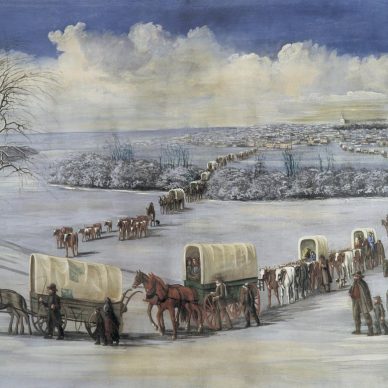The Gospel Doctrine lesson #34; Doctrine and Covenants 136, “This Shall Be Our Covenant, “Ministry of Brigham Young: A Visionary Leader.”
How do we continue when we are at our capacity? overwhelmed? terrified? When hope seems cruel? When grief has swallowed us whole? When the darkness closes in and light is a faint memory? When even just the thought of faith is too much to bare?
I celebrated my sixth wedding anniversary by moving into my own apartment. I had left my now ex-husband just a few weeks prior. I moved into a lovely prewar apartment in the Avenues neighborhood of Salt Lake City. It was an ideal place for me to find myself again and begin the long road of healing. Even though I wanted to end my marriage…Even though I was beginning to build a life I wanted…I still had to walk through the valley of sorrow into the depths of despair.
In this lovely apartment in the Avenues with my life in pieces, I grieved the sorrows of my marriage and the the dreams I had hoped for. The internal motivation to meet my commitments and not to disappoint others was numbed by depression. My morning alarm clock would go off and I wouldn’t care about going into work. The time would come and go that I should have been in the shower, should have been in the car, should have been at my desk and I just didn’t care.
But I wanted to care. I wanted to show up in my life. I knew that if I could just get myself out of bed, I could show up in some capacity. But I had to get out of bed.
On one particularly difficult morning, my usual pleadings with myself to get out of bed weren’t working and I was already late for work. As I laid there my focus turned to my pioneer ancestors. I visualized them crossing the plains based upon family lore and journals I had read. I thought of what had been asked of them. How they knew the anguish of leaving one life to create a new one. How they knew the pain and suffering of disappointment, betrayal, grief and fear. And how, in spite of all that, they managed to cross the plains step-by-step. They persevered by taking the next step.
A voice deep inside of me said – Liz, your ancestors crossed the plains. Their blood runs in your veins. If they can walk step-by-step from Winter Quarters to the Salt Lake Valley, you can get out of bed. Get. Out. Of. Bed.
And I did.
The lesson manual asks us to ponder the similarities between our journey in this mortal existence and the trek of our early foremothers and fathers. The story I shared illustrates this. It was in that moment when my ancestors transitioned from mythical characters to flesh and blood – my flesh and blood. I could not persevere through the destruction of my marriage and my rebirth with solely my own faculties to draw upon. I needed more and my ancestors provided. I still feel their presence in my life and this moment is a touchstone for me as I continue to navigate the valleys of sorrows and depths of despair that are an innate part of this mortal journey.
Now, we are a global church with many converts. I imagine there are more Mormons without Utah pioneer ancestors then there are with. Yes, their blood my run in my veins, but their stories and their legacy are every Mormon’s. The moment you entered the waters of baptism., the early pioneers became your foremothers and fathers – their legacy becomes your legacy, their stories your stories.
One of the core values of the Mormon Women Project is the power of sharing our stories. A primary purpose of our interviews is for us as Mormon women to understand that we are not alone and for us to see and embrace the diversity within our community. The interviews are witnesses to the many different ways Mormon women honor our covenants and try to make meaning out of this mortal existence. A woman recently told me that reading the MWP interviews help her persevere in her depression. It was helpful for her to read stories that broke down the myth of perfectionism and see how real Mormon women grapple with real life.
This is why it’s also important that we seek out, read and share the stories of the Mormon pioneers. They too can help us persevere in our personal lives and as global citizens. As Mormons it behooves us to know and claim our history that we may be reminded that we are a people who know what it is to be religiously persecuted. That we are a people who know the real consequences of having a country/government turn on you. And what it means to be a refugee. The early Saints were not motivated by a political agenda or a party affiliation. They were motivated by their covenants, by their love of God, by their familial bonds and by their commitment to restoring the Gospel of Jesus Christ. As we navigate the struggles of our lives and of the world, may we remember the sacrifices and perseverance of the Utah Mormon pioneers by honoring our covenants and be courageous enough to take the next step (whatever that may mean).
